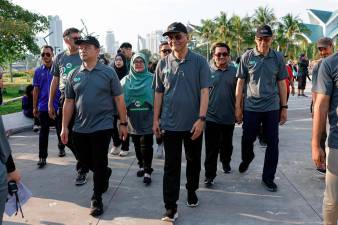KUALA LUMPUR: Nearly 10,800 Malaysians are waiting for organ transplants, yet only a fraction of more than 400,000 registered pledges since 1997 have resulted in actual donations, Health Minister Datuk Seri Dr Dzulkefly Ahmad said.
He said kidneys are the most urgently needed, followed by liver, heart and lung transplants but donations often fail to proceed without family consent.
Launching the National Organ and Tissue Donation Awareness Week 2025 at Taman Tasik Titiwangsa today, Dzulkefly urged Malaysians to respect the wishes of loved ones who had registered as donors.
“Too often, organ donations cannot proceed because families withhold consent. This year’s theme, Derma Organ: Warisku, Hormati Ikrarku (Organ Donation: My Heirs, Respect My Pledge), is about ensuring that donors’ wishes are respected.
“If families honour these pledges, many more lives could be saved,” he said.
As of July, 404,975 Malaysians had registered as organ donors, including 16,635 new pledges through the MySejahtera app. Despite this, donation rates remain low.
In 2024, only 46 posthumous donations were recorded, equivalent to 1.33 donors per million population (PMP).
By comparison, Turkiye recorded 7.5 PMP, the United States 34.14 PMP, and Spain 52.56 PMP.
“These figures show we are still far behind. Countries such as Saudi Arabia, Turkiye and Iran – all Muslim-majority nations – have made organ donation a national priority.
“We must strengthen awareness across all races, cultures and religions in Malaysia,” Dzulkefly said.
He said that the demand for transplants continues to rise as cases of end-stage organ failure increase nationwide.
“In 2023 alone, about 53,000 Malaysians were living with end-stage kidney failure. Dialysis is not a cure, it is only a treatment – three times a week, three hours per session. We must move beyond dialysis and focus on curative therapy – organ transplants,” he said.
Since the country’s first local transplant in 1975, Malaysia has successfully performed 3,359 organ transplants – 2,238 from living donors and 1,121 from deceased donors.
Tissue donations, including corneas, heart valves, bones and skin grafts, are also on the rise, with nearly 200 recorded in 2024.
A milestone was achieved last year when 74% of cornea transplants at Sungai Buloh Hospital used tissue donated by Malaysian citizens, reducing reliance on foreign sources.
Looking ahead, Dzulkefly said the Health Ministry plans to transform the National Transplant Resource Centre into the National Transplant Centre to strengthen governance, expand capacity and accelerate innovation in transplantation.
“It can no longer just be talk, workshops or blueprints. We must leave footprints – real outcomes. Strong governance, proper coordination across centres and strategic planning are key,” he said.
Malaysia will also push the organ donation agenda onto the regional stage.
Dzulkefly said Malaysia would champion organ donation as a collective regional priority during the Asean Health Ministers’ Meeting in 2026.
“Organ donation is not merely a medical issue, but one of compassion and sacrifice. Let us together make it a legacy of humanity, passed from one generation to the next,” he said.
Acknowledging challenges such as workforce shortages, the contract doctor system and limited resources, Dzulkefly nevertheless stressed that organ donation will remain a key priority for the ministry.
